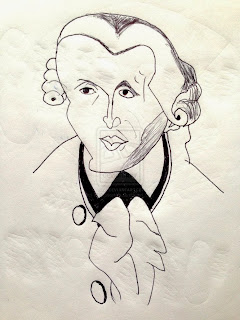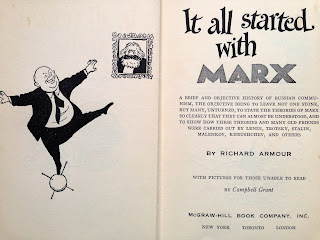"Once upon a time there was no such thing as Communism. People ignorantly toiled and saved, hoping to Get Ahead like the heroes in Horatio Alger's books, which they forgot were fiction. Frequently, blinded by sentimentality, they left money to their Loved Ones. When this was done on a large scale, it led to the accumulation of huge fortunes, like those of Rockefeller, Carnegie, and Ford, which some harebrained member of the younger generation was sure to squander on public libraries and housing projects."
Thus begins
Richard Armour's It All Started With Marx. I recently came across this book in a used bookstore in
Fairport, NY, which, either because they did not realize the value of this book, or because, having read the book they came to disdain money and greed, they only charged $4 for it. As it unfortunately appears to no longer be in print, I have reproduced some of the many delightful anecdotes, as well as illustrations by Campbell Grant, for you below. At the very least they should help spruce up your Marx lecture power points.
 |
| Marx and Engels, from the book cover |
"
Karl Marx was born in the Rhineland city of Trier, early on the morning of May 5, 1818. It was an ungodly hour, which may explain Marx's later attitude toward religion. He awoke everyone with his cries, and few realized that even then he was complaining about the injustice of it all."
"[Rasputin] was finally murdered by a group of conservative noblemen who believed in paying their way. they had to poison him, shoot him, and drown him before he gave up. Then he died of a broken heart, suddenly aware of his unpopularity."
"What qualified Marx for his proletariat (he already had his baccalaureate) was the work he did with his hands. Bending over a desk in the public library, he lifted ideas out of books from morning till night."
"At any rate Marx set out to give the laboring class a chance to suffer in a new way. He spread his doctrine far and wide, and sometimes spread it pretty thin. When he was not lecturing, he wrote feverishly. He had a genius for being pithy. Frequently he could boil down a simple idea and state it in 400 pages."
"[
Lenin] took to reading
Das Kapital. This he did in the kitchen, probably because reading about poverty made him hungry and he wanted to be where he could grab a bite of
kavkaski shasslik before starting the next chapter."
"Comrades, now the world is yours,
Gently flow its open sewers.
If a corpse goes floating,
Yours is not to reason why.
If you do, much though we sorrow,
You'll be in there, too, tomorrow."
"As we look back over the Bolsheviks and the Mensheviks, the Whites and the Reds, the purgers and the purged, we must leave the reader with one final thought. There are those who feel a certain nostalgia for the good old days of Ivan the Terrible, who had never read Marx and had no use for the proletariat. At least you could go to bed at night and wake up in the morning, secure in the knowledge of whom to hate."
















